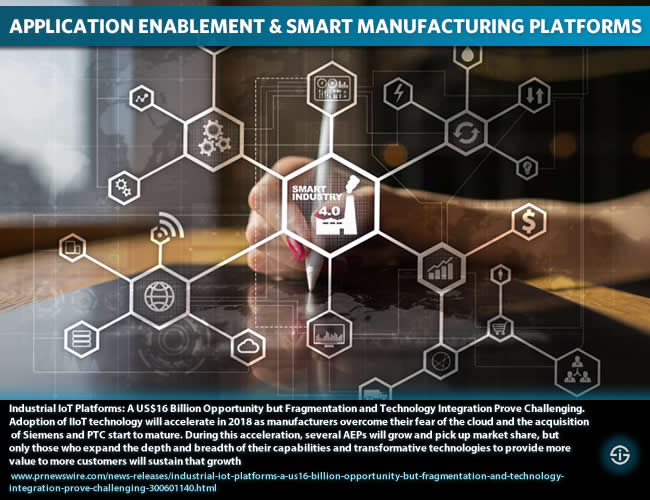In the digital transformation of manufacturing and other industries in the sphere of Industrial IoT (IIoT) and Industry 4.0, the Internet of Things or IoT, in combination with myriad other technologies which are increasingly converging (AI and IoT, IoT and blockchain, etc.), becomes more and more important.
With manufacturing being the number one industry from an IoT spending perspective as reflected by IoT spending 2018 data from IDC, vendors of IIoT platforms are adding new functionalities, support for multi-cloud environments, artificial intelligence and machine learning and the enablement of applications in areas such as digital twins and augmented reality to their portfolios to enable manufacturers to unlock the full value of IoT in manufacturing.
With an increasing role for edge computing and fog computing, the Industrial IoT platform market is changing fast as covered previously. This is also the case for manufacturing platforms. Although the segment of these platforms overlaps with IIoT platforms overall, there are vendors with a more vertical offering for manufacturers to start moving or progress on the smart manufacturing and industry journey.

The key role of IoT platforms in manufacturing IoT deployments
Before looking at some evolutions as observed in a report from ABI Research, the Smart Manufacturing Platforms Assessment, a quick reminder on what exactly IoT platforms are since the term IoT platform but also the term Industrial IoT platform are used by companies that don’t really offer such platforms.
As mentioned on our IoT platform overview page IDC defines IoT platforms as offering some combination of the following capabilities:
- The management of IoT endpoints and connectivity
- Access, ingestion, and processing of IoT data
- Visualization and analysis of IoT data
- IoT application development and integration tools
Previously we looked at the Industrial IoT market with some findings from the “Landscaping IIoT Platforms—Vendor Clusters and Growth Prospects” report which Frost & Sullivan announced earlier 2018.
The press release of the report gives a good summary of the key role of IoT platforms. We quote: “Coupled with rapidly advancing IoT techniques, IoT platforms are set to create new business models aimed at enhanced connectivity, control and convergence. Businesses are now racing to convert raw machine and process data into actionable and useful insights in real-time. IoT platforms are at the core of this revolution, providing users with the flexibility and tools needed to develop application-centric functions unique to each industry”.
Smart Manufacturing Platforms Assessment: strategic trends, technological evolutions and market considerations
Back to manufacturing and IoT manufacturing platforms with a look at the mentioned ABI Research report. End February 2018, ABI Research announced its Smart Manufacturing Platforms Assessment, calling the Industrial IoT platform market a US$16 Billion opportunity and pointing at the fact that both fragmentation and technology integration in the market prove challenging.

Here as well the integration of technologies such as augmented reality and artificial intelligence is mentioned, leading ABI Research to recommend Industrial IoT platform providers to deepen and broaden the capabilities of platform to support that integration (AI is increasingly present in all types of IoT platforms, including smart city platforms).
From a market approach perspective ABI Research recommends Industrial IoT platform providers that offer solutions for manufacturers to sell to IT and work closely with OT while manufacturers, are advised to seek partners that will provide consulting as they continue to evolve. It once again stresses the importance of partnerships and ecosystems.
When selecting a smart manufacturing platform or let’s say an Industrial IoT platform for manufacturing, many factors obviously play a role. However, it all starts with clearly defining what such a platform is, knowing that application enablement is essential and there are many vendors who don’t really sell IIoT platforms although calling them so.
Application enablement platforms for manufacturing
Application enablement comes back in the definition of IDC and also takes center stage in the definition of MachNation which recently looked at IoT edge platforms and has an IoT platform test lab, MachNation MIT-E.
In a post on the IoT platform market we mentioned how IoT application enablement platforms and platform-enabled solutions are strictly seen the two types of IoT platforms according to the company.
All this terminology confusion brings us back to the ABI Research Smart Manufacturing Platforms Assessment as ABI also sheds some light on it.
In the press release ABI Research indeed also points to the terminology issue. Quote: “It seems that almost every company that has built a piece of software for the IIoT calls it a platform, and as such, IIoT platforms come in a variety of flavors. Perhaps the ‘platforms’ that most suit that word fill the role of an application enablement platform (AEP)“.
And what do such application enablement platforms do? Quote again: “AEPs extract data from devices and move it to applications based at the edge or in the cloud. This platform might have connectivity or device management tools. It might also act as a data orchestration system and include an app store or have app development capabilities whereby users can create and access applications that generate insights from their data”.
While AEPs offer a solution to import data, ABI Research says, they often require partners to provide gateways with some having a one-stop-shop model as you can read in detail on the report landing page where you can also get it.
On top of these AEPs ABI also looks at some IIoT platforms that have a more specific scope in its Smart Manufacturing Platform Assessment report as you’ll read below.
Vendors, companies and guidance in the Smart Manufacturing Platforms Assessment report
Taking this into account (definitions do matter), we remember augmented reality, artificial intelligence, partnerships and consulting and, as Principal Analyst Pierce Owen puts it the need for platform providers to work with suppliers of other transformative technologies to provide the most valuable functions and components (and remain relevant).
As an example he mentions augmented reality applications which “require business rule functions, digital twin functionality, near real-time metrics, zero-touch onboarding, and advanced analytics features”.
According to the ABI Research Smart Manufacturing Platform Assessment report, Siemens Mindsphere is a leader in the Industrial IoT platform market from the application enablement platform viewpoint.
FogHorn Systems is cited as a key innovator in real edge computing and complex event processing (CEP) at the edge in the category of Industrial IoT platforms which specialize in a specific piece of application enablement or microservice such as fog computing or processing raw sensor data.
More about the why of those choices in the Smart Manufacturing Platforms Assessment report press release and in the report that offers guidance for both manufacturing platform vendors and manufacturers and which you can buy here.
Industrial IoT platforms and companies in the ABI Smart Manufacturing Platforms Assessment: OT, PTC, Cloudera, Amazon, SAP, IBM, Apache, Azure, Caterpillar, Intel, ANSYS, Open Technologies, ThingWorx and Bosch.
Top image: Shutterstock – Copyright: Wright Studio – All other images are the property of their respective mentioned owners.

